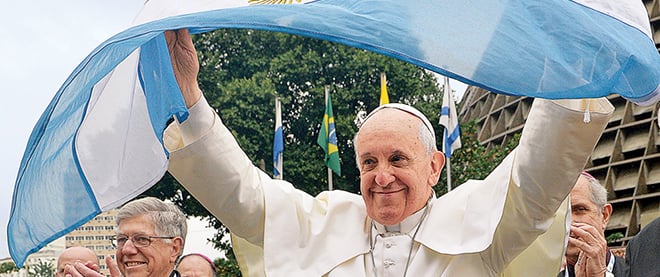The pope’s outspoken politics
Pope Francis proves his rock-star status among Catholics
Luca Zennaro/Reuters
Share

Pope Francis picked a seemingly inopportune place to swap Portuguese for his native Spanish. While visiting Rio de Janeiro, he called on the business, political and intellectual classes to eliminate “elitism” and “poverty” and to “dialogue” with protesters unhappy with their politicians. That he did so in Spanish—an Argentine in a country that claims “God is Brazilian”—and that the tough talk won him praise, not jeers, says everything about his veritable rock-star status in the region.
His first foreign trip as pontiff thrust him into the Latin American political picture as a straight-talking moral authority in a region rife with inequality, corruption and violence. It also filled a void left by the most prominent and controversial politician, late Venezuelan president Hugo Chávez, who succumbed to cancer. “He’s the new giant of both the Latin American political and religious landscapes,” says Andrew Chesnut, religious studies professor at Virginia Commonwealth University. “He’s much bigger than Chávez because of his far greater appeal.”
That appeal was on display in Rio, where he was received as a superstar and convened three million for mass at Copacabana Beach. Pope Francis also signalled his papal priorities during the visit, showing his solidarity with the poor by speaking with favela residents on a soggy soccer pitch.
Politicians are paying attention to the region’s new star. They include his old enemy, Argentine President Cristina Fernández de Kirchner, whose populist politics and approach to the poor were previously pilloried by Francis. Nowadays, Fernández and her party claim Francis as their own, even putting his picture on their posters.
Francis seems willing to turn the page on Argentina, focusing instead on righting regional wrongs. He embraced the Amazon’s indigenous people, lashed out at the idea of legalizing drugs (a measure nearing approval in Uruguay) and condemned drug cartels as “merchants of death”—something his predecessor stayed silent on while visiting Mexico last year. But he made the most waves on the flight home, telling reporters he wouldn’t “judge” gay priests. His political star may shine brightly beyond Latin America, too.